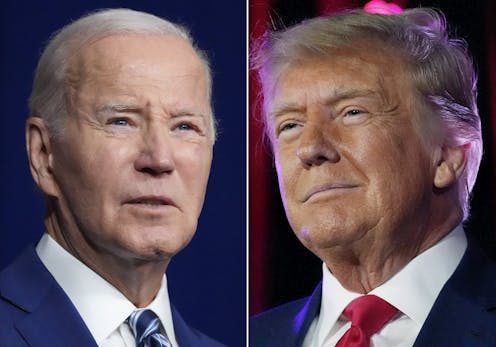Candidates’ aging brains are factors in the presidential race − 4 essential reads
- Written by Jeff Inglis, Politics + Society Editor, The Conversation US

The leading contenders in the 2024 presidential election are two of the three oldest people ever to serve as president. President Joe Biden is 81[1]. Former President Donald Trump is 77[2]. Ronald Reagan took office at 69[3] and left it at age 77.
Both Biden and Trump have faced criticism about what can appear to be obvious signs of aging, including questions about their memory[4] and cognitive abilities[5].
Scholars writing for The Conversation U.S. have discussed various aspects of how aging affects people’s brains. Here we spotlight four articles that collectively explain why there is cause for concern, why there is no clear statement to be made about any specific person’s cognitive power as they age, and ways people can preserve their brain power into their golden years.
1. Decline in thinking can come with age
Brandeis psychology professor Angela Gutchess[6], who studies brain activity to understand human thought, said there is a body of work documenting a cognitive decline in aging people:
“Past behavioral data[7] largely pointed to loss in cognitive – that is, thinking – abilities with age, including poorer memory and greater distractibility.”
But her work has also found that “aging brains can reorganize and change, and not necessarily for the worse.”
Read more: Aging brains aren't necessarily declining brains[8]
2. Some people age faster than others
Aging is an individual experience, explained Aditi Gurkar[9], a geriatric medicine scholar at the University of Pittsburgh:
“Although age is the principal risk factor[10] for several chronic diseases, it is an unreliable indicator of how quickly your body will decline or how susceptible you are to age-related disease. This is because there is a difference between your chronological age, or the number of years you’ve been alive, and your biological age – your physical and functional ability.”
Gurkar’s work has been focused on the latter, noting that some people with the same chronological ages can have very different cognitive and physical abilities. Key factors include the strength of a person’s social connections, as well as their sleeping habits, water consumption, exercise and diet.
Read more: Are you a rapid ager? Biological age is a better health indicator than the number of years you've lived, but it's tricky to measure[11]
As University of Pittsburgh geriatric scholar Aditi Gurkar notes in her TED Talk, aging is not just a number.3. Even cells age differently inside the body
Ellen Quarles[12], who teaches cellular and molecular biology of aging at the University of Michigan, explained that aging is so individualized that it varies even at the cellular level:
“There is no single cause of aging[13]. No two people age the same way, and indeed, neither do any two cells. There are countless ways for your basic biology to go wrong over time, and these add up to create a unique network of aging-related factors for each person that make finding a one-size-fits-all anti-aging treatment extremely challenging.”
Read more: Aging is complicated – a biologist explains why no two people or cells age the same way, and what this means for anti-aging interventions[14]
4. There is a way to preserve abilities
Brian Ho[15] and Ronald Cohen[16], University of Florida scholars who study brain health in aging people, have found that physical activity makes a real difference in cognition:
“People in the oldest stage of life[17] who regularly engage in aerobic activities and strength training exercises perform better on cognitive tests than those who are either sedentary or participate only in aerobic exercise.”
Specifically, they found:
“(T)hose who incorporated both aerobic exercises, such as swimming and cycling, and strength exercises like weightlifting into their routines – regardless of intensity and duration – had better mental agility, quicker thinking and greater ability to shift or adapt their thinking.”
Read more: Aerobic and strength training exercise combined can be an elixir for better brain health in your 80s and 90s, new study finds[18]
Whether it’s for Biden and Trump or anyone else, these scholars advise staying active, deepening connections with family and friends and recognizing that not everyone ages the same way.
This story is a roundup of articles from The Conversation’s archives.
References
- ^ Joe Biden is 81 (www.usatoday.com)
- ^ Donald Trump is 77 (www.usatoday.com)
- ^ Reagan took office at 69 (thehill.com)
- ^ questions about their memory (www.washingtonpost.com)
- ^ cognitive abilities (www.reuters.com)
- ^ Angela Gutchess (scholar.google.com)
- ^ Past behavioral data (theconversation.com)
- ^ Aging brains aren't necessarily declining brains (theconversation.com)
- ^ Aditi Gurkar (scholar.google.com)
- ^ Although age is the principal risk factor (theconversation.com)
- ^ Are you a rapid ager? Biological age is a better health indicator than the number of years you've lived, but it's tricky to measure (theconversation.com)
- ^ Ellen Quarles (scholar.google.com)
- ^ There is no single cause of aging (theconversation.com)
- ^ Aging is complicated – a biologist explains why no two people or cells age the same way, and what this means for anti-aging interventions (theconversation.com)
- ^ Brian Ho (theconversation.com)
- ^ Ronald Cohen (scholar.google.com)
- ^ People in the oldest stage of life (theconversation.com)
- ^ Aerobic and strength training exercise combined can be an elixir for better brain health in your 80s and 90s, new study finds (theconversation.com)
Authors: Jeff Inglis, Politics + Society Editor, The Conversation US

